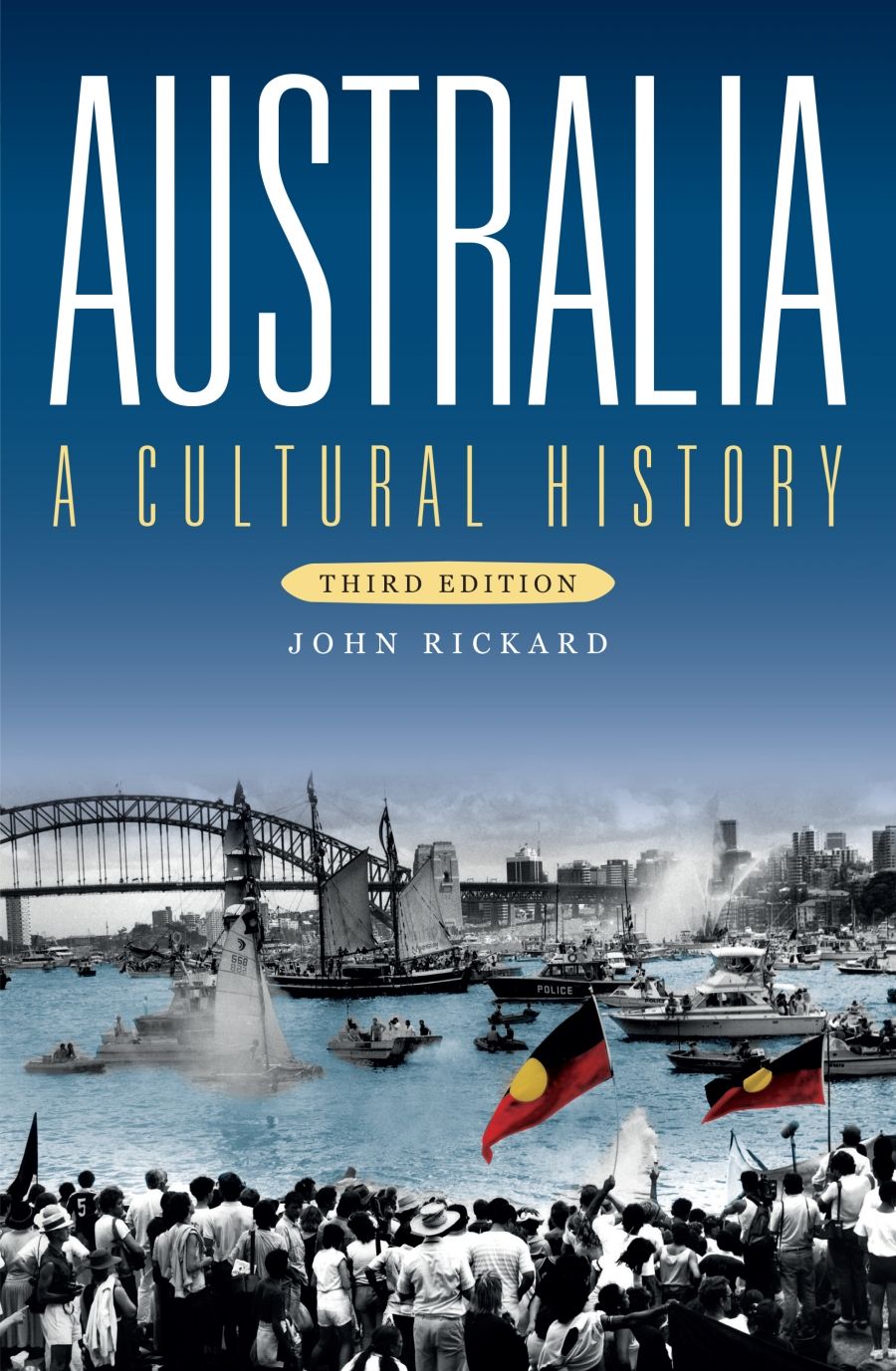
- Free Article: No
- Contents Category: Australian History
- Review Article: Yes
- Article Title: Searching for Australian culture
- Online Only: No
- Custom Highlight Text:
It has a brave title, John Rickard’s Australia: A cultural history, for that adjective ‘cultural’ raises expectations difficult to meet. ‘Culture’, as Raymond Williams has explained, ‘is one of the two or three most complicated words in the English language.’ After reading the book I cannot help wondering whether the substitution of the word ‘social’ would have made for a more accurate subtitle. For what Rickard has given us is an impressive synopsis of recent research and inherited wisdom about the nature of Australian society. It will be a welcome addition to university and college reading lists on Australian history, but it is not, I believe, at the most fundamental level, ‘a cultural history’.
- Book 1 Title: Australia
- Book 1 Subtitle: A cultural history
- Book 1 Biblio: Longman Cheshire, $18.95 pb, 309 pp
Yet the strengths should be emphasised. Rickard’s Australia is a fresh, elegant social history taking readers from Aboriginal Australia, through the colonial era and the period 1901–1939, to a final section on the period since 1939. Within this chronological framework, it deals with many of the central themes in the shaping of Australian society – migration, the environment, patterns of social and political organisation, dependency, multiculturalism, etc.
John Rickard emerges as an informed and subtle scholar, wellversed in current historiographical debates and preoccupations. As the Longman Cheshire blurb assures readers, he ‘avoids the tedious detailing of governors and governments’, but not simply for the laudable, but negative, reason of eschewing tedium. His readers are never permitted to lose sight of the fact that all human activity is constrained by the geohistorical realties of particular times and places. They will learn less about the activities and aspirations of the rich and powerful than about complex interactions between social groups and institutions from all levels of society, and their understanding of Australian history will be all the better for this emphasis.
Knowledge is advanced both by those with an eye for the particular, skilled in drawing subtle distinctions, and by those whose genius it is to reintegrate partial visions, to look at a general picture in new ways. Rickard’s Australia is an integrative study in this best sense, shrewd in its appreciation of the meaningful vignette, yet constant in its grasp of the broad picture into which the rich variety of Australia’s past must be located.
This is the book’s greatest strength. Australian history has become so richly fragmented that one welcomes among the monographs a work genuinely integrative in style and content. It is always easy to leave the quest for more general perspectives in the basket called ‘too hard’. Indeed, for most of us this is the wisest course. We can comprehend particular themes and sub-themes, but the total picture eludes us, or at the very least its shapes and colours lie beyond the limits of the expressible.
So we serve as critics for those scholars who, like John Rickard, take up the challenge. And there are always things to criticise. Inevitably there are frustrations arising from the pace at which the discussion moves in a general history of only three hundred pages. The balance will not satisfy everyone. Many will find too little on women in Rickard’s work. Others will decide that there is too much on the literary and visual arts compared with the rather cursory attention given to more formal or less fashionable ways of ascribing and affirming social and personal meaning. For a history written from ‘a cultural perspective’ there is too little on religion – or secularisation. Illuminating accounts of the impact of war on domestic society are not accompanied by any discussion of what those hundreds of thousands of Australians who have seen the sharp end of war have brought home from the battlefield in their memories and in their hearts.
Which returns us to that elusive quest for a genuine cultural history. Freud tells us that ‘culture’ is that which defends us from nature. Material culture, on this view, is the fire which offers warmth, the spear which thwarts the sabre tooth tiger, the tools which till the earth and harvest its bounty, the computer which controls the complexities of a sophisticated technology. Non-material culture is the knowledge that brings mastery over natural forces and makes sense of nature’s bewildering variety of phenomena, the values guiding human behaviour into constructive rather than anti-social patterns of behaviour; the beliefs that have interpreted, however precariously, that vast range of human experience which, throughout history, has transcended human knowledge and control; the rituals and symbols through which such knowledge, assumptions, values and beliefs have been legitimated, maintained and reinforced.
Rickard uses the idea of culture in this essentially anthropological way. The aim of the book, he says ‘has been to tell the story of Australia through an examination of its evolving values, beliefs, rites, and customs’. There could scarcely be a more challenging aim for an Australian historian to undertake, for there can be no partial, piecemeal resolution of this kind of historical task. Culture is nothing if not a more or less integrated system of knowledge, pseudoknowledge, beliefs, assumptions, expectations, norms and values, together with the symbols and rituals which reinforce them. The fundamental quest is to explore and explain linkages between, for example, beliefs and values, between norms, rituals and customs, or myths, symbols and historical experience. To focus on particular aspects of a culture, whatever detail or variety of the treatment, is to leave undone the really crucial task of historical and anthropological integration. At this fundamental level (it is scarcely a criticism to say) Rickard leaves the cultural history of Australia still awaiting its maestro.


Comments powered by CComment